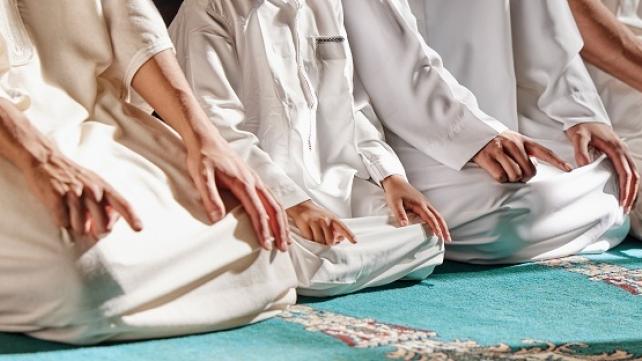
As the second third of Ramadan starts, every fasting Muslim is eagerly seeking the last ten nights. The spiritual high of Taraweeh (night prayers) and Qiyaam (late night prayers after midnight) we experience is unparalleled to any other prayer of the rest of the year on these nights.
Candice Islaah Abd’al-Rahim, has thoroughly discussed the significance of these nights in her article Anticipating the Last Ten Nights of Ramadan.1 She details how to prepare spiritually for the last ten nights and develop a Worship Plan.
The focus of this article is to discuss how to prepare our bodies health wise for the last ten nights so that we can enjoy the most benefit and fully participate in worship individually, as a family, and as a congregation.
It is important to first understand how our bodies typically react to the first 20 days of fasting with changes in:
- Metabolism: Initially, the body adapts to the fasting state by using up stored glycogen for energy. After several days, it shifts to a state of ketosis, where it begins to break down fat stores for energy. This can lead to weight loss.2
- Blood Sugar: During fasting, blood sugar levels drop, and the body becomes more sensitive to insulin. This can improve blood sugar control in individuals with diabetes. However, it's essential for diabetic individuals to monitor their blood sugar levels closely during fasting.3
- Digestion: Fasting can give the digestive system a break, allowing it to rest and repair. Some people report improved digestion and gastrointestinal health during and after Ramadan fasting. I hereby attest to this.4
- Detoxification: Fasting can help with the detoxification process in the body as organs like the liver and kidneys become better at removing toxins.5
- Mental Clarity: Some individuals report improved mental focus and clarity during fasting, although others may experience temporary fatigue or difficulty concentrating, especially in the initial days of fasting.6
- Spiritual and Psychological Benefits: Fasting during Ramadan is not only a physical practice but also a spiritual one. Many people experience a sense of spiritual fulfillment, increased empathy, and gratitude during this time.
Intermittent fasting has become a huge trend for celebrities and common folks, too, Muslims and non-Muslims alike. There is some scientific research as well as anecdotal data available now which has not been before, though still incomplete. It would be wise to be cautious about these findings when some studies are undermining the benefits of fasting.
- First, sometimes a health study is seeking to confirm an already existing bias or is sponsored by an interest group.
- Second, the research may not be using the best standards of practice or a proper sample size and may not account for various factors necessary for an authentic study.
For Islamic rituals and practices, the default truth is always Allah’s decree. Sometimes, science may take a stand against it. As a Muslim, we just wait for science to catch up with the truth.
Solutions
In the West, most Muslim families do not alter their daily schedules for Ramadan. Parents are working full time and sometimes the important due dates fall within the month of Ramadan. Children are attending school at regular hours and may have tests and projects due. It can become quite hectic for a family to juggle these and keep up with the fasting and worship plan during Ramadan. Therefore, fasting for 20 days can pose a risk when done incorrectly. This can make the adults and children in a family too tired to enjoy the fasting, community events, Taraweeh and Qiyaam. And maybe even result in sickness, fatigue, weakness, and other health issues toward the end of the month. These risks may include:
- dehydration
- electrolyte imbalances
- nutrient deficiencies
- and muscle loss7
Plan of Action
Keep these strategies in mind as you prepare yourself physically for the last 10 nights.
Step up hydration and electrolytes.
Some Muslims try to compete with Hoover Dam in Ramadan. Consuming too much water results in flushing of essential nutrients from the body and may cause health issues. It's crucial to stay replenished with fluids and essential nutrients, but drink reasonably, frequently, and in smaller amounts during the waking hours. Here are some tips to stay well hydrated:
- It’s a good idea to hydrate with electrolyte drinks. To offset the cost of the drinks, electrolyte packets in powder form can be purchased from any store or online. Its best to purchase powdered electrolyte packets with low added sugar content.
- Coconut water is a great source of good energy. It is low in calories and carbs and high in potassium.
Maintain proper nutrition.
Follow these tips:
- Avoid overindulging in foods. Some families try to make up for a missed meal by cramming an additional meal between the fasting. Instead, include a light snack like a fruit salad, yogurt drink, warm milk, or soup after Isha (night prayers) and before bedtime.
- Some families include too many fried items in their meals. It’s a good idea to replace them with baked items. Have you tried air frying or baking samosas and fries? It works!
- Make an iftar plan to include complex carbohydrates, vegetables, protein, and healthy fats. This will ensure a balanced diet and will maintain your and your family’s energy levels.
- Practice portion control. It helps to plate the yummy foods before breaking the fast.
- Consider adding vitamins and nutritious but low-sugar protein drinks to the family meal plan. Of your family’s favorite fruit flavor, make a Lassi (Yogurt Drink) or a low sugar shake with the protein drink.
Exercise.
We should not be anxious about exercising in Ramadan. Some folks think that it’ll make them hungrier or too thirsty. Engaging in daily life activities is part of the fasting ritual. Observe these tips:
- Engage in light physical activity, such as walking or stretching, to maintain muscle mass and improve circulation.
- Avoid intense exercise during fasting hours, and schedule workouts for non-fasting times.
- Consider parking at a distance when visiting masjid for Taraweeh or visiting family and friends for iftar, or when going to work. This would help you get your steps.
- If you are home, then a ten-minute walk on the treadmill, around the house or neighborhood a couple of times would be helpful and will serve as a good distraction.
If you have specific health concerns or medical conditions, consult with healthcare professionals, such as a doctor or dietitian, for personalized advice and guidance on managing your health during Ramadan.
In conclusion, discuss with your family how to help each other prepare for the last ten nights of Ramadan. Ask the young ones to give you reminders when feeling weak and overcome with the desire to abandon your carefully crafted Ramadan action plan. Motivate each other and share the joy of Ramadan.
In the last ten nights, may Allah accept all your worship, supplications and bless you and your family with Laylatul Qadr (Night of Power). Ameen
End Notes
1 Anticipating the Last Ten Nights of Ramadan | SoundVision.com
2 Source: Antoni, R., Johnston, K. L., Collins, A. L., & Robertson, M. D. (2018). Effects of intermittent fasting on glucose and lipid metabolism. Proceedings of the Nutrition Society, 77(2), 107-117.
3 Trepanowski, J. F., & Bloomer, R. J. (2010). The impact of religious fasting on human health. Nutrition journal, 9(1), 57.
4 Bahammam, A. S., Almushailhi, K., Pandi-Perumal, S. R., Sharif, M. M., & Hammad, O. (2013). The effect of Ramadan fasting on sleep architecture: an observational, longitudinal study. Annals of Thoracic Medicine, 8(2), 93–98.
5 Patterson, R. E., & Sears, D. D. (2017). Metabolic effects of intermittent fasting. Annual Review of Nutrition, 37, 371–393.
6 Almeneessier, A. S., BaHammam, A. S., & Sharif, M. M. (2019). The effects of Ramadan fasting on sleep patterns and daily activities: a systematic review. Sleep and Breathing, 23(1), 5–18.
7 Kul, S., Savaş, E., & Öztürk, Z. A. (2014). Nutritional status of children during Ramadan. Pediatrics international: official journal of the Japan Pediatric Society, 56(3), 508–512.
Tayaabah Qazi has a master’s degree in Educational Leadership, an AdminI/II Certification from the State of Maryland Education Department, and a Secondary Teaching Certification in Chemistry as well as a CPP certificate. She has served in the education field as a teacher and an administrator of schools. Recently, she served at Community College of Baltimore County as a Coordinator of Adult Basic Education program. Currently, Tayaabah is the Program Manager at the Office of Workforce Development at Maryland Department of Labor. She has been a long-time resident of Maryland for 17 years, with her family, but hails from Southern California. She is also a staunch believer of the 4 Cs: Compassion. Commitment. Conversation. Cultivation.






Add new comment